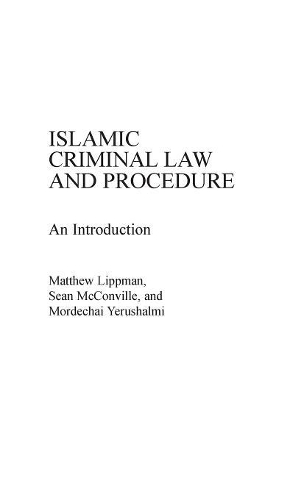
Islamic Criminal Law and Procedure: An Introduction
(Hardback)
Publishing Details
Islamic Criminal Law and Procedure: An Introduction
By (Author) Matthew Lippman
By (author) Mordecha Yerushalmi
Bloomsbury Publishing PLC
Praeger Publishers Inc
8th August 1988
United States
Classifications
Tertiary Education
Non Fiction
Laws of specific jurisdictions and specific areas of law
342.00917671
Physical Properties
Hardback
188
Description
The body of Islamic law, or Shari'a, is central to the understanding of Islamic society and the current conflict between fundamentalism and modernism in the Islamic world. While acknowledging the regional differences in the local characteristics of the Shari'a, this work provides a straightforwaard introduction to procedure and punishment, discussing the major concepts, principles, and practices. The establishment of the Shari'a signified a progressive step in the development of legal practice as it modified the Islamic customs of retaliation and blood revenge. Nevertheless, Islamic law differs from common and civil codes due to its religious and virtually unchageable nature. This work begins with a discussion of the history and spread of Islam and outlines the origins of Islamic law. The next chapters discuss substantive criminal law, procedure, and punishment. The work concludes with a discussion of the role of Islamic law in the twentieth century. The final chapter also identifies a number of issues that warrant further study. Unlike other treatments of Islamic culture, which make only passing reference to the body of law, and unlike more academic discussions of the Shari'a this guide should be usuelf to the academician and the general reader alike and rovide important background for courses in comparative criminal procedure, comparative legal systems, and comparative politics and the Middle East.
Author Bio
MATTHEW LIPPMAN is an Associate Professor in the Department of Criminal Justice at the University of Illinois at Chicago. SEAN McCONVILLE is also an Associate Professor in the Department of Criminal Justice at the University of Illinois at Chicago. MORDECHAI YERUSHALMI is a research and teaching assistant in the Department of Criminal Justice at the University of Illinois at Chicago.
